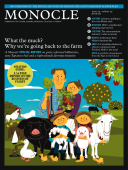
Issue 24
A Monocle Special report on goats, reformed kibbutzim, tasty Japanese beef and a high-altitude farming initiative.
In This Issue
Oops! No content was found.
Looks like we no longer have content for the page you're on. Perhaps try a search?
Return Home

